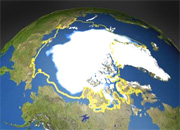Conducted under a government contract, the study will be undertaken by the holding company’s subsidiary Sevmorgeo, a St. Petersburg-based marine geological company.
The project provides for studying the northern part of the East Siberian Sea and the adjacent deep-water sedimentary basin outside the areas of current licenses.
The area to be studied totals 215 km2, the volume of airborne geophysical operations - at least 55,000 linear km.
Field operations will require using dual (GPS and GLONASS) GNSS multi-frequency receivers to ensure that geographic reference during airborne surveying in high latitudes is accurate. Airborne magnetometry is achieved by monitoring variations of the Earth’s magnetic field in the work area, subsequently, to be factored in during geophysical data calibration.
“Inclement weather notwithstanding, all studies in the area are slightly ahead of schedule”, said Oleg Korchagin, Rosgeologia head for administering hydrocarbon exploration projects. “Once field operations are over, a fully-fledged geophysical base will be created enabling geological studies and development of the oil and gas resources of the region in question. It will comprise new-generation digital maps of gravitational and magnetic fields. Current digital mock-ups of potential fields and their transformants will be created, forming the basis for a layout of hydrocarbon prospects, and recommendations worked out regarding further offshore studies in the East Siberian Sea.
Findings will also be used to compile 1000/3 state geological map sheets and generate additional arguments to validate the external border of Russia’s continental shelf in the Arctic in the key region where the Mendeleev Rise meets the adjacent shelf.
The studies under the contract are to be completed by year-end. All work is conducted in complete accordance with the principles of the Marine Doctrine of the Russian Federation and other directives based on it.
15 Декабря 2025 | понедельник | 03:35


